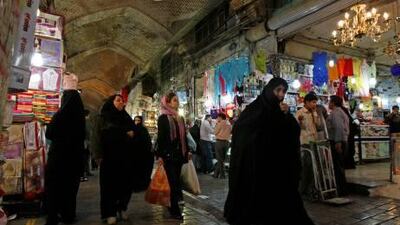President Mahmoud Ahmadinejad says Iranian families that consume less energy will benefit when planned cuts in government subsidies for fuel and some foodstuffs go into effect.
The Iranian government pays more than $100bn (Dh3.67bn) annually in subsidies for many commodities, including petrol and other fuel, bread, cooking oil and even detergent powder. Under legislation approved by parliament in March, however, the government must reduce subsidies by 20 per cent - or US$20 billion -during the current fiscal year, which ends March 20, 2011.
Implementation of the plan has been postponed for seven months, but the government is still mandated to secure the US$20 billion in savings, which means that when the subsidy cuts finally do take effect, they will be felt widely.
The Iranian president, however, reassured Iranians that the impact of the cuts would not be dire.
"There is absolutely no heavy pressure on the way," he said in an interview broadcast Saturday on state-run television.
Mr Ahmadinejad promised Iranians that the cuts in subsidies will reduce the gap between rich and poor in Iran. The rich, who consume more fuel for their cars and more energy in their houses, will have to pay for their consumption, while the poor, who use less energy, will be able to save some of the money that the government is distributing to offset the impact of the subsidy cuts, he said.
To offset the impact of subsidy cuts, some 53 million Iranians are receiving 810,000 rials each under the legislation passed by parliament in March. In the interview on Saturday, Mr Ahmadinejad disclosed that the amount of 810,000 rials is a two-month allocation. The government will continue to pay the same amount every two months after subsidies are cut, he said.
The president also urged Iranians to tighten their belts, avoid unnecessary spending in the next six months and help government inspectors identify individuals who stockpile commodities in order to sell them at higher prices.
Mr Ahmadinejad declined to reveal what the new energy or foodstuff prices will be and the date the new prices will come into force.
Government officials have repeatedly said that only the president himself of these details and that he will announce them when he deems fit. Keeping the details of the reforms is meant to "reduce the [negative] consequences of the announcement [of the new prices] to the minimum", Mr Ahmadinejad said.
Critics of Mr Ahmadinejad's economic reform plan have repeatedly warned that despite the need for reforms in the government's subsidy programme, a radical change in a time of economic instability and economic sanctions could trigger rampant inflation.
Mr Ahmadinejad, however, is adamant that the country's economy has not been affected by sanctions. "Sanctioning Iran is the most ridiculous decision made by world politicians. They don't know Iran," he said on Saturday.
Increases in the cost of transportation and some foodstuffs have already been felt in cities, and some consumers have resorted to squirreling away goods before wider price increases take effect.
"Some people are hoarding cooking oil, rice, sugar and even tissue paper fearing a shortage or much higher prices once the announcement is finally made," said Roya, as she shopped for cooking oil in a large Tehran supermarket.
The price of some foodstuff has risen by about 30 per cent in expectation of high inflation, moderate legislator Jahanbakhsh Amini told the Iranian Student's News Agency.
Elsewhere in Iran, some Iranians have received higher electricity and gas bills in the past three months. The government has denied that price increases in these commodities have taken effect, saying the additional charges were for overconsumption.
Critics, particularly those among the government's political opposition, have warned of possible social unrest of inflation soars.
Jaras, an opposition website, claimed yesterday that the deployment of thousands of police in the capital on Saturday was rehearsal in anticipation of protests after the announcement of new fuel and food prices.

